Circular light rail
The Circular light rail (Chinese: 環狀輕軌) is a light rail line in Kaohsiung, Taiwan, operated by Kaohsiung Rapid Transit.[6] The south part of this line makes use of the defunct tracks of the Kaohsiung Harbour Line.
| Circular light rail | |||||||||||||||||||||||||||||||||||||||||||||||||||||||||||||||||||||||||||||||||||||||||||||||||||||||||||||||||||||||||||||||||||||||||||||||||||||||||||||||||||||||||||||||||||||||||||||||||||||||||||||||||||||||||||||||||||||||||||||||||||||||||||||||||||||||||||||||||||||||||||||||||||||||||||||||||||||||||||||||||||||||||||||||||||||||||||||||||||||||||||||||||||||||||||||||||||||||
|---|---|---|---|---|---|---|---|---|---|---|---|---|---|---|---|---|---|---|---|---|---|---|---|---|---|---|---|---|---|---|---|---|---|---|---|---|---|---|---|---|---|---|---|---|---|---|---|---|---|---|---|---|---|---|---|---|---|---|---|---|---|---|---|---|---|---|---|---|---|---|---|---|---|---|---|---|---|---|---|---|---|---|---|---|---|---|---|---|---|---|---|---|---|---|---|---|---|---|---|---|---|---|---|---|---|---|---|---|---|---|---|---|---|---|---|---|---|---|---|---|---|---|---|---|---|---|---|---|---|---|---|---|---|---|---|---|---|---|---|---|---|---|---|---|---|---|---|---|---|---|---|---|---|---|---|---|---|---|---|---|---|---|---|---|---|---|---|---|---|---|---|---|---|---|---|---|---|---|---|---|---|---|---|---|---|---|---|---|---|---|---|---|---|---|---|---|---|---|---|---|---|---|---|---|---|---|---|---|---|---|---|---|---|---|---|---|---|---|---|---|---|---|---|---|---|---|---|---|---|---|---|---|---|---|---|---|---|---|---|---|---|---|---|---|---|---|---|---|---|---|---|---|---|---|---|---|---|---|---|---|---|---|---|---|---|---|---|---|---|---|---|---|---|---|---|---|---|---|---|---|---|---|---|---|---|---|---|---|---|---|---|---|---|---|---|---|---|---|---|---|---|---|---|---|---|---|---|---|---|---|---|---|---|---|---|---|---|---|---|---|---|---|---|---|---|---|---|---|---|---|---|---|---|---|---|---|---|---|---|---|---|---|---|---|---|---|---|---|---|---|---|---|---|---|---|---|---|---|---|---|---|---|---|---|---|---|---|---|---|---|---|---|---|---|---|---|---|---|---|---|---|---|---|---|---|---|---|---|---|---|---|
 | |||||||||||||||||||||||||||||||||||||||||||||||||||||||||||||||||||||||||||||||||||||||||||||||||||||||||||||||||||||||||||||||||||||||||||||||||||||||||||||||||||||||||||||||||||||||||||||||||||||||||||||||||||||||||||||||||||||||||||||||||||||||||||||||||||||||||||||||||||||||||||||||||||||||||||||||||||||||||||||||||||||||||||||||||||||||||||||||||||||||||||||||||||||||||||||||||||||||
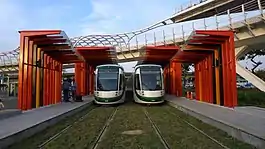 CAF Urbos trams parked at Cianjhen Star | |||||||||||||||||||||||||||||||||||||||||||||||||||||||||||||||||||||||||||||||||||||||||||||||||||||||||||||||||||||||||||||||||||||||||||||||||||||||||||||||||||||||||||||||||||||||||||||||||||||||||||||||||||||||||||||||||||||||||||||||||||||||||||||||||||||||||||||||||||||||||||||||||||||||||||||||||||||||||||||||||||||||||||||||||||||||||||||||||||||||||||||||||||||||||||||||||||||||
| Overview | |||||||||||||||||||||||||||||||||||||||||||||||||||||||||||||||||||||||||||||||||||||||||||||||||||||||||||||||||||||||||||||||||||||||||||||||||||||||||||||||||||||||||||||||||||||||||||||||||||||||||||||||||||||||||||||||||||||||||||||||||||||||||||||||||||||||||||||||||||||||||||||||||||||||||||||||||||||||||||||||||||||||||||||||||||||||||||||||||||||||||||||||||||||||||||||||||||||||
| Native name | |||||||||||||||||||||||||||||||||||||||||||||||||||||||||||||||||||||||||||||||||||||||||||||||||||||||||||||||||||||||||||||||||||||||||||||||||||||||||||||||||||||||||||||||||||||||||||||||||||||||||||||||||||||||||||||||||||||||||||||||||||||||||||||||||||||||||||||||||||||||||||||||||||||||||||||||||||||||||||||||||||||||||||||||||||||||||||||||||||||||||||||||||||||||||||||||||||||||
| Chinese name | |||||||||||||||||||||||||||||||||||||||||||||||||||||||||||||||||||||||||||||||||||||||||||||||||||||||||||||||||||||||||||||||||||||||||||||||||||||||||||||||||||||||||||||||||||||||||||||||||||||||||||||||||||||||||||||||||||||||||||||||||||||||||||||||||||||||||||||||||||||||||||||||||||||||||||||||||||||||||||||||||||||||||||||||||||||||||||||||||||||||||||||||||||||||||||||||||||||||
| Traditional Chinese | 環狀輕軌 | ||||||||||||||||||||||||||||||||||||||||||||||||||||||||||||||||||||||||||||||||||||||||||||||||||||||||||||||||||||||||||||||||||||||||||||||||||||||||||||||||||||||||||||||||||||||||||||||||||||||||||||||||||||||||||||||||||||||||||||||||||||||||||||||||||||||||||||||||||||||||||||||||||||||||||||||||||||||||||||||||||||||||||||||||||||||||||||||||||||||||||||||||||||||||||||||||||||||
| |||||||||||||||||||||||||||||||||||||||||||||||||||||||||||||||||||||||||||||||||||||||||||||||||||||||||||||||||||||||||||||||||||||||||||||||||||||||||||||||||||||||||||||||||||||||||||||||||||||||||||||||||||||||||||||||||||||||||||||||||||||||||||||||||||||||||||||||||||||||||||||||||||||||||||||||||||||||||||||||||||||||||||||||||||||||||||||||||||||||||||||||||||||||||||||||||||||||
| Status | Operational | ||||||||||||||||||||||||||||||||||||||||||||||||||||||||||||||||||||||||||||||||||||||||||||||||||||||||||||||||||||||||||||||||||||||||||||||||||||||||||||||||||||||||||||||||||||||||||||||||||||||||||||||||||||||||||||||||||||||||||||||||||||||||||||||||||||||||||||||||||||||||||||||||||||||||||||||||||||||||||||||||||||||||||||||||||||||||||||||||||||||||||||||||||||||||||||||||||||||
| Owner | Kaohsiung City Government | ||||||||||||||||||||||||||||||||||||||||||||||||||||||||||||||||||||||||||||||||||||||||||||||||||||||||||||||||||||||||||||||||||||||||||||||||||||||||||||||||||||||||||||||||||||||||||||||||||||||||||||||||||||||||||||||||||||||||||||||||||||||||||||||||||||||||||||||||||||||||||||||||||||||||||||||||||||||||||||||||||||||||||||||||||||||||||||||||||||||||||||||||||||||||||||||||||||||
| Locale | Kaohsiung, Taiwan | ||||||||||||||||||||||||||||||||||||||||||||||||||||||||||||||||||||||||||||||||||||||||||||||||||||||||||||||||||||||||||||||||||||||||||||||||||||||||||||||||||||||||||||||||||||||||||||||||||||||||||||||||||||||||||||||||||||||||||||||||||||||||||||||||||||||||||||||||||||||||||||||||||||||||||||||||||||||||||||||||||||||||||||||||||||||||||||||||||||||||||||||||||||||||||||||||||||||
| Termini | Lizihnei Hamasen | ||||||||||||||||||||||||||||||||||||||||||||||||||||||||||||||||||||||||||||||||||||||||||||||||||||||||||||||||||||||||||||||||||||||||||||||||||||||||||||||||||||||||||||||||||||||||||||||||||||||||||||||||||||||||||||||||||||||||||||||||||||||||||||||||||||||||||||||||||||||||||||||||||||||||||||||||||||||||||||||||||||||||||||||||||||||||||||||||||||||||||||||||||||||||||||||||||||||
| Stations | 23 | ||||||||||||||||||||||||||||||||||||||||||||||||||||||||||||||||||||||||||||||||||||||||||||||||||||||||||||||||||||||||||||||||||||||||||||||||||||||||||||||||||||||||||||||||||||||||||||||||||||||||||||||||||||||||||||||||||||||||||||||||||||||||||||||||||||||||||||||||||||||||||||||||||||||||||||||||||||||||||||||||||||||||||||||||||||||||||||||||||||||||||||||||||||||||||||||||||||||
| Website | krtco.com.tw | ||||||||||||||||||||||||||||||||||||||||||||||||||||||||||||||||||||||||||||||||||||||||||||||||||||||||||||||||||||||||||||||||||||||||||||||||||||||||||||||||||||||||||||||||||||||||||||||||||||||||||||||||||||||||||||||||||||||||||||||||||||||||||||||||||||||||||||||||||||||||||||||||||||||||||||||||||||||||||||||||||||||||||||||||||||||||||||||||||||||||||||||||||||||||||||||||||||||
| Service | |||||||||||||||||||||||||||||||||||||||||||||||||||||||||||||||||||||||||||||||||||||||||||||||||||||||||||||||||||||||||||||||||||||||||||||||||||||||||||||||||||||||||||||||||||||||||||||||||||||||||||||||||||||||||||||||||||||||||||||||||||||||||||||||||||||||||||||||||||||||||||||||||||||||||||||||||||||||||||||||||||||||||||||||||||||||||||||||||||||||||||||||||||||||||||||||||||||||
| Type | Light rail | ||||||||||||||||||||||||||||||||||||||||||||||||||||||||||||||||||||||||||||||||||||||||||||||||||||||||||||||||||||||||||||||||||||||||||||||||||||||||||||||||||||||||||||||||||||||||||||||||||||||||||||||||||||||||||||||||||||||||||||||||||||||||||||||||||||||||||||||||||||||||||||||||||||||||||||||||||||||||||||||||||||||||||||||||||||||||||||||||||||||||||||||||||||||||||||||||||||||
| System | Kaohsiung Rapid Transit | ||||||||||||||||||||||||||||||||||||||||||||||||||||||||||||||||||||||||||||||||||||||||||||||||||||||||||||||||||||||||||||||||||||||||||||||||||||||||||||||||||||||||||||||||||||||||||||||||||||||||||||||||||||||||||||||||||||||||||||||||||||||||||||||||||||||||||||||||||||||||||||||||||||||||||||||||||||||||||||||||||||||||||||||||||||||||||||||||||||||||||||||||||||||||||||||||||||||
| Services | Lizihnei–Hamasen | ||||||||||||||||||||||||||||||||||||||||||||||||||||||||||||||||||||||||||||||||||||||||||||||||||||||||||||||||||||||||||||||||||||||||||||||||||||||||||||||||||||||||||||||||||||||||||||||||||||||||||||||||||||||||||||||||||||||||||||||||||||||||||||||||||||||||||||||||||||||||||||||||||||||||||||||||||||||||||||||||||||||||||||||||||||||||||||||||||||||||||||||||||||||||||||||||||||||
| Operator(s) | Kaohsiung Rapid Transit Corporation | ||||||||||||||||||||||||||||||||||||||||||||||||||||||||||||||||||||||||||||||||||||||||||||||||||||||||||||||||||||||||||||||||||||||||||||||||||||||||||||||||||||||||||||||||||||||||||||||||||||||||||||||||||||||||||||||||||||||||||||||||||||||||||||||||||||||||||||||||||||||||||||||||||||||||||||||||||||||||||||||||||||||||||||||||||||||||||||||||||||||||||||||||||||||||||||||||||||||
| Depot(s) | Cianjhen Depot | ||||||||||||||||||||||||||||||||||||||||||||||||||||||||||||||||||||||||||||||||||||||||||||||||||||||||||||||||||||||||||||||||||||||||||||||||||||||||||||||||||||||||||||||||||||||||||||||||||||||||||||||||||||||||||||||||||||||||||||||||||||||||||||||||||||||||||||||||||||||||||||||||||||||||||||||||||||||||||||||||||||||||||||||||||||||||||||||||||||||||||||||||||||||||||||||||||||||
| Rolling stock | CAF Urbos[1] Alstom Citadis[2] | ||||||||||||||||||||||||||||||||||||||||||||||||||||||||||||||||||||||||||||||||||||||||||||||||||||||||||||||||||||||||||||||||||||||||||||||||||||||||||||||||||||||||||||||||||||||||||||||||||||||||||||||||||||||||||||||||||||||||||||||||||||||||||||||||||||||||||||||||||||||||||||||||||||||||||||||||||||||||||||||||||||||||||||||||||||||||||||||||||||||||||||||||||||||||||||||||||||||
| Daily ridership | 9499[3] | ||||||||||||||||||||||||||||||||||||||||||||||||||||||||||||||||||||||||||||||||||||||||||||||||||||||||||||||||||||||||||||||||||||||||||||||||||||||||||||||||||||||||||||||||||||||||||||||||||||||||||||||||||||||||||||||||||||||||||||||||||||||||||||||||||||||||||||||||||||||||||||||||||||||||||||||||||||||||||||||||||||||||||||||||||||||||||||||||||||||||||||||||||||||||||||||||||||||
| Ridership | 3,364,578 (2018) | ||||||||||||||||||||||||||||||||||||||||||||||||||||||||||||||||||||||||||||||||||||||||||||||||||||||||||||||||||||||||||||||||||||||||||||||||||||||||||||||||||||||||||||||||||||||||||||||||||||||||||||||||||||||||||||||||||||||||||||||||||||||||||||||||||||||||||||||||||||||||||||||||||||||||||||||||||||||||||||||||||||||||||||||||||||||||||||||||||||||||||||||||||||||||||||||||||||||
| History | |||||||||||||||||||||||||||||||||||||||||||||||||||||||||||||||||||||||||||||||||||||||||||||||||||||||||||||||||||||||||||||||||||||||||||||||||||||||||||||||||||||||||||||||||||||||||||||||||||||||||||||||||||||||||||||||||||||||||||||||||||||||||||||||||||||||||||||||||||||||||||||||||||||||||||||||||||||||||||||||||||||||||||||||||||||||||||||||||||||||||||||||||||||||||||||||||||||||
| Opened | 2016-07-04[4] | ||||||||||||||||||||||||||||||||||||||||||||||||||||||||||||||||||||||||||||||||||||||||||||||||||||||||||||||||||||||||||||||||||||||||||||||||||||||||||||||||||||||||||||||||||||||||||||||||||||||||||||||||||||||||||||||||||||||||||||||||||||||||||||||||||||||||||||||||||||||||||||||||||||||||||||||||||||||||||||||||||||||||||||||||||||||||||||||||||||||||||||||||||||||||||||||||||||||
| Technical | |||||||||||||||||||||||||||||||||||||||||||||||||||||||||||||||||||||||||||||||||||||||||||||||||||||||||||||||||||||||||||||||||||||||||||||||||||||||||||||||||||||||||||||||||||||||||||||||||||||||||||||||||||||||||||||||||||||||||||||||||||||||||||||||||||||||||||||||||||||||||||||||||||||||||||||||||||||||||||||||||||||||||||||||||||||||||||||||||||||||||||||||||||||||||||||||||||||||
| Line length | 12.8 km (8.0 mi) | ||||||||||||||||||||||||||||||||||||||||||||||||||||||||||||||||||||||||||||||||||||||||||||||||||||||||||||||||||||||||||||||||||||||||||||||||||||||||||||||||||||||||||||||||||||||||||||||||||||||||||||||||||||||||||||||||||||||||||||||||||||||||||||||||||||||||||||||||||||||||||||||||||||||||||||||||||||||||||||||||||||||||||||||||||||||||||||||||||||||||||||||||||||||||||||||||||||||
| Number of tracks | 2 | ||||||||||||||||||||||||||||||||||||||||||||||||||||||||||||||||||||||||||||||||||||||||||||||||||||||||||||||||||||||||||||||||||||||||||||||||||||||||||||||||||||||||||||||||||||||||||||||||||||||||||||||||||||||||||||||||||||||||||||||||||||||||||||||||||||||||||||||||||||||||||||||||||||||||||||||||||||||||||||||||||||||||||||||||||||||||||||||||||||||||||||||||||||||||||||||||||||||
| Character | Ground level, elevated | ||||||||||||||||||||||||||||||||||||||||||||||||||||||||||||||||||||||||||||||||||||||||||||||||||||||||||||||||||||||||||||||||||||||||||||||||||||||||||||||||||||||||||||||||||||||||||||||||||||||||||||||||||||||||||||||||||||||||||||||||||||||||||||||||||||||||||||||||||||||||||||||||||||||||||||||||||||||||||||||||||||||||||||||||||||||||||||||||||||||||||||||||||||||||||||||||||||||
| Track gauge | 1,435 mm (4 ft 8 1⁄2 in) standard gauge | ||||||||||||||||||||||||||||||||||||||||||||||||||||||||||||||||||||||||||||||||||||||||||||||||||||||||||||||||||||||||||||||||||||||||||||||||||||||||||||||||||||||||||||||||||||||||||||||||||||||||||||||||||||||||||||||||||||||||||||||||||||||||||||||||||||||||||||||||||||||||||||||||||||||||||||||||||||||||||||||||||||||||||||||||||||||||||||||||||||||||||||||||||||||||||||||||||||||
| Electrification | Electric capacitor | ||||||||||||||||||||||||||||||||||||||||||||||||||||||||||||||||||||||||||||||||||||||||||||||||||||||||||||||||||||||||||||||||||||||||||||||||||||||||||||||||||||||||||||||||||||||||||||||||||||||||||||||||||||||||||||||||||||||||||||||||||||||||||||||||||||||||||||||||||||||||||||||||||||||||||||||||||||||||||||||||||||||||||||||||||||||||||||||||||||||||||||||||||||||||||||||||||||||
| Operating speed | 70 km/h (43 mph) maximum[5] | ||||||||||||||||||||||||||||||||||||||||||||||||||||||||||||||||||||||||||||||||||||||||||||||||||||||||||||||||||||||||||||||||||||||||||||||||||||||||||||||||||||||||||||||||||||||||||||||||||||||||||||||||||||||||||||||||||||||||||||||||||||||||||||||||||||||||||||||||||||||||||||||||||||||||||||||||||||||||||||||||||||||||||||||||||||||||||||||||||||||||||||||||||||||||||||||||||||||
| |||||||||||||||||||||||||||||||||||||||||||||||||||||||||||||||||||||||||||||||||||||||||||||||||||||||||||||||||||||||||||||||||||||||||||||||||||||||||||||||||||||||||||||||||||||||||||||||||||||||||||||||||||||||||||||||||||||||||||||||||||||||||||||||||||||||||||||||||||||||||||||||||||||||||||||||||||||||||||||||||||||||||||||||||||||||||||||||||||||||||||||||||||||||||||||||||||||||
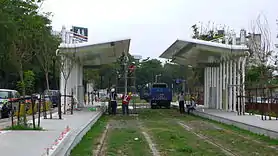


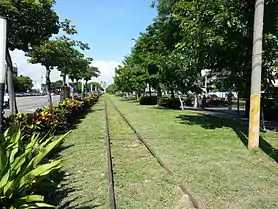
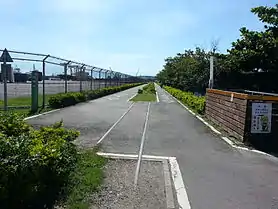
Forecast to cost 16.5 billion New Taiwan dollars, it is expected be the world's first light rail vehicle system on a fully catenary-free route.[7][8]
Phase I construction consists of a section of line from Station C1 to Station C14, where Stations C3 and C14 are the transfer stations to Red line and Orange line, respectively. Construction of Phase I began on 4 June 2013.[9] Stations C1 to C14 were tested from August 2015 (rides on the trams are open to the public for free during testing[10]). The civil construction part of stations C1 to C14 had been completed, and Phase I achieved full operations on September 2017.[11][12] The CAF Urbos trams used in this line parked at or passed by these stations for demonstrations and tests in several events from November 2014 onwards.
Phase II construction will not start until the Kaohsiung urban railway is relocated underground in 2017. It partially opened on January 12, 2021.[13] The northern section was originally scheduled to be completed in June 2021 with the rest of phase II, but was delayed due to opposition of local residents. It is now projected to open in 2023.[14][15]
History
| Phase | Segment | Commencement | Length | Stations |
|---|---|---|---|---|
| I | Lizihnei - Hamasen | July 4, 2016[9] | 8.7[15] | 14 |
| II Initial | Hamasen - Singlong Rd.
Lizihnei - Rainbow Park |
January 12, 2021[15] | 4.1[15] | 9 |
| II Full | Singlong Rd. - Rainbow Park | 2023 | 9.3 | 15 |
Stations
| Code | Station Name | Connection | District | |
|---|---|---|---|---|
| English | Chinese | |||
| — ↑ Loop line towards Depot ↑ — | ||||
| C1 | Lizihnei | 籬仔內 | Fongshan (planned) | Cianjhen |
| C2 | Kaisyuan Rueitian | 凱旋瑞田 | ||
| C3 | Cianjhen Star | 前鎮之星 | R via Kaisyuan (R6) | |
| C4 | Kaisyuan Jhonghua | 凱旋中華 | ||
| C5 | Dream Mall | 夢時代 | ||
| C6 | Commerce and Trade Park | 經貿園區 | ||
| C7 | Software Technology Park | 軟體園區 | ||
| C8 | Kaohsiung Exhibition Center | 高雄展覽館 | ||
| C9 | Cruise Terminal | 旅運中心 | Lingya | |
| C10 | Glory Pier | 光榮碼頭 | ||
| C11 | Love Pier | 真愛碼頭 | Yancheng | |
| C12 | Dayi Pier-2 | 駁二大義 | ||
| C13 | Penglai Pier-2 | 駁二蓬萊 | Gushan | |
| C14 | Hamasen | 哈瑪星 | O via Sizihwan (O1) | |
| C15 | Shoushan Park (ALIEN Art Centre) | 壽山公園 (金馬賓館當代美術館) |
||
| C16 | Wenwu Temple | 文武聖殿 | ||
| C17 | Gushan District Office | 鼓山區公所 | ||
| C18 | Gushan | 鼓山 | ||
| C19 | MaKatao | 馬卡道 | ||
| C20 | TRA Museum of Fine Arts Station | 臺鐵美術館 | ||
| C21A | Museum of Fine Art West | 美術館西 | ||
| C21 | Museum of Fine Art East | 美術館東 | ||
| C22 | Kaohsiung Municipal United Hospital | 聯合醫院 | ||
| C23 | Longhua Elementary School | 龍華國小 | ||
| C24 | Heart of Love River | 愛河之心 | R via Aozihdi (R13) | |
| C25 | Sin-shan Elementary School | 新上國小 | Zuoying | |
| C26 | Wanzihnei | 灣仔內 | Sanmin | |
| C27 | Dingshan Strees | 鼎山街 | ||
| C28 | Kaohsiung Industrial High School | 高雄高工 | ||
| C29 | Shu-Te Home Economics & Commercial High School | 樹德家商 | ||
| C30 | Science and Technology Museum | 科工館 | ||
| C31 | St. Joseph Hospital | 聖功醫院 | Lingya | |
| C32 | Kaisyuan Park | 凱旋公園 | O via Wukuaicuo (O8),via Culture Center (O7) | |
| C33 | Department of Health | 衛生局 | ||
| C34 | Wucyuan Elementary Scool | 五權國小 | Yellow (planned) | |
| C35 | Kaisyuan Wuchang | 凱旋武昌 | ||
| C36 | Kaisyuan Ersheng | 凱旋二聖 | Cianjhen | |
| C37 | LRT Depot | 輕軌機廠 | ||
| — ↓ Loop line towards Lizihnei ↓ — | ||||
Rolling stock
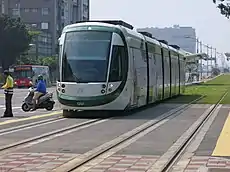
The line's fleet consist of nine CAF Urbos trams that will operate catenary-free.[8] The tramway cars are 34 meters (112 ft) in length, and will be able to transport a total of 250 passengers (seated, and standing).[7]
15 Alstom Citadis X05 305 trains will be introduced.[16] The first Alstom trams entered service in November 2020.[16]
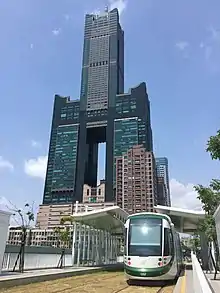
Ticket
Unlike the Kaohsiung MRT Red Line and the Orange Line, the Kaohsiung Light Rail is charged at a lower rate. As of January 2019, the fare for each light rail is NT$30. There is special offer by using the digital wallet (such as iPass, EasyCard, icash, etc.) is NT$10. Card readers are available at each station and inside of tramway. When paying the fare by the e-ticket (digital wallet), passengers are only charged one of them at each time. When paying by cash, passengers can purchase tickets at the ticket vending machines at each station for the ticket inspector to check.
Previous light rail demonstration project
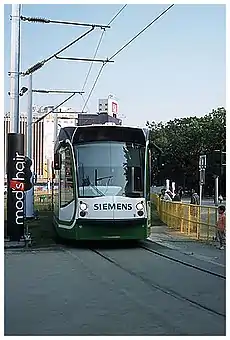
In 2004, the Kaohsiung City Government and Siemens built a temporary two-station circular light rail line in Central Park, operated by a single trainset, in order to demonstrate the feasibility of building a light rail system in Kaohsiung City. It was meant to alleviate some residents' concerns that light rail would negatively impact their surroundings by producing excessive noise and hindering normal traffic flow. This Siemens Combino vehicle would later become the D2 Class operated in Melbourne, Australia.
References
- "Kaohsiung picks CAF to build catenary-free trams". Railway Gazette International. 2013-01-07. Retrieved 2013-07-23.
- "The 1st tram for Kaohsiung arrives in Taiwan". 2018-09-04. Retrieved 2020-12-19.
- "Transport statistics". stat.motc.gov.tw (in Chinese). Retrieved 10 November 2019.
- "領先全台 高雄輕軌4日正式通車 | 社會". 新頭殼 Newtalk (in Chinese). 4 July 2016. Retrieved 10 November 2019.
- "KAOHSIUNG LRV". CAF. Retrieved 2013-07-23.
- "Light Rail System - Project Content". Mass Rapid Transit Bureau, Kaohsiung City. 2012-08-17. Retrieved 2013-07-23.
- "Trams: Kaohsiung Launches Taiwan's First Light Rail Service". Kaohsiung City Government. 2015-01-08. Archived from the original on 2015-01-28. Retrieved 2015-01-25.
- "Trams: KAOHSIUNG TRAMWAY". CAF. Retrieved 2014-03-20.
- "Kaohsiung begins circular light rail construction". Focus Taiwan News Channel. 2013-06-04. Retrieved 2013-07-23.
- Tim Berge (2015-10-16). "Kaohsiung LRT Opens to Public". ICRT FM.100. Retrieved 2016-02-27.
- "About Taiwan". Info Taiwan. 2014-03-17. Archived from the original on 2014-04-14. Retrieved 2014-03-20.
- James Chuang (2015-06-08). "Kaohsiung light rail line set to go full circle". International Railway Journal. Retrieved 2016-02-27.
- "New light rail stop - Focus Taiwan". focustaiwan.tw (in Chinese). Retrieved 2021-01-12.
- "Kaohsiung light rail system to be completed by 2023: mayor - Focus Taiwan". focustaiwan.tw (in Chinese). Retrieved 2021-01-02.
- "New Kaohsiung circular light rail section to go into service Jan. 12 - Focus Taiwan". focustaiwan.tw (in Chinese). Retrieved 2021-01-08.
- "Alstom Citadis X05 trams enter service on South Circular LRT in Taiwan". Railway Technology. Retrieved 2021-02-03.
External links
| Wikimedia Commons has media related to Kaohsiung LRT Circular Line. |
- Kaohsiung LRT Network Map
- Kaohsiung LRT Project(Phase I) Project Brief
- LRT Pages in Kaohsiung Metro Construction Bureau
- The newest Kaohsiung LRT proposal clip
- Older Kaohsiung LRT proposal clip